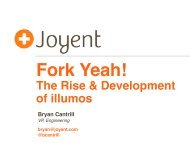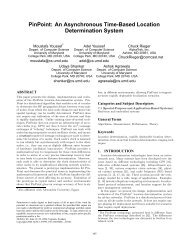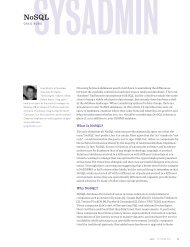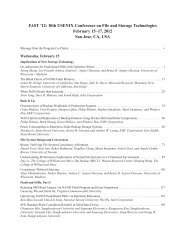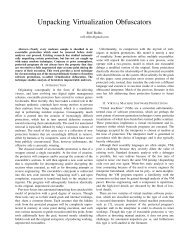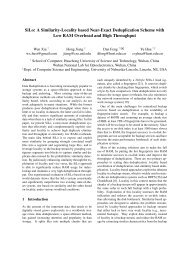2nd USENIX Conference on Web Application Development ...
2nd USENIX Conference on Web Application Development ...
2nd USENIX Conference on Web Application Development ...
Create successful ePaper yourself
Turn your PDF publications into a flip-book with our unique Google optimized e-Paper software.
0 10 20 30<br />
Number of Vulnerabilities<br />
Number of Vulnerabilities vs. Framework Support<br />
no support manual opt in opt out<br />
Framework Support<br />
XSS SQL Injecti<strong>on</strong><br />
Auth. Bypass<br />
Figure 4: Level of framework support vs. number of vulnerabilities<br />
for integer-valued vulnerability classes. The area of a<br />
mark scales with the number of observati<strong>on</strong>s at its center.<br />
ities, we would expect most of the points to be clustered<br />
around (or below) a line with a negative slope.<br />
For each of the three 4 classes, we performed a <strong>on</strong>eway<br />
ANOVA test between framework support for the<br />
vulnerability class and number of vulnerabilities in the<br />
class. N<strong>on</strong>e of these results are statistically significant.<br />
Our data set allows us to compare <strong>on</strong>ly frameworks<br />
with no support to frameworks with manual support because<br />
the implementati<strong>on</strong>s in our data set do not use<br />
frameworks with str<strong>on</strong>ger support (with <strong>on</strong>e excepti<strong>on</strong>).<br />
We found no significant difference between these levels<br />
of support. However, this data set does not allow us to<br />
examine the effect of opt-in, opt-out, or always-<strong>on</strong> support<br />
<strong>on</strong> vulnerability rates. In future work, we would like<br />
to analyze implementati<strong>on</strong>s that use frameworks with<br />
str<strong>on</strong>ger support for these vulnerability classes. Example<br />
frameworks include CodeIgniter’s xss clean [1],<br />
Google Ctemplate [3], and Django’s autoescape [2],<br />
all of which provide opt-out support for preventing XSS<br />
vulnerabilities. A more diverse data set might reveal relati<strong>on</strong>ships<br />
that cannot be gleaned from our current data.<br />
Table 5 displays the relati<strong>on</strong>ship between framework<br />
support and vulnerability status for each of the binary<br />
vulnerability classes.<br />
There does not appear to be any relati<strong>on</strong>ship for password<br />
storage. Many of the implementati<strong>on</strong>s use frameworks<br />
that provide opt-in support for secure password<br />
storage, but they do not use this support and are therefore<br />
vulnerable anyway. This highlights the fact that manual<br />
framework support is <strong>on</strong>ly as good as developers’ awareness<br />
of its existence.<br />
Sessi<strong>on</strong> management and CSRF do, <strong>on</strong> the other hand,<br />
appear to be in such a relati<strong>on</strong>ship. Only the two implementati<strong>on</strong>s<br />
that lack framework support for sessi<strong>on</strong><br />
4 The level of framework support for stored XSS and reflected XSS<br />
is identical in each implementati<strong>on</strong>, so we combined these two classes.<br />
management have vulnerable sessi<strong>on</strong> management. Similarly,<br />
<strong>on</strong>ly the two implementati<strong>on</strong>s that have framework<br />
support for CSRF were not found to be vulnerable to<br />
CSRF attacks. Both results were found to be statistically<br />
significant using Fisher’s exact test (p =0.028 for each).<br />
The difference in results between the integer-valued<br />
and binary vulnerability classes suggests that manual<br />
support does not provide much protecti<strong>on</strong>, while more<br />
automated support is effective at preventing vulnerabilities.<br />
During our manual source code review, we frequently<br />
observed that developers were able to correctly<br />
use manual support mechanisms in some places, but they<br />
forgot or neglected to do so in other places.<br />
Figure 5 presents the results from our identificati<strong>on</strong> of<br />
the lowest level at which framework support exists that<br />
could have prevented each individual vulnerability (as<br />
described in Secti<strong>on</strong> 3.4).<br />
It is rare for developers not to use available automatic<br />
support (the darkest bars in Figure 5b show <strong>on</strong>ly 2 such<br />
vulnerabilities), but they comm<strong>on</strong>ly fail to use existing<br />
manual support (the darkest bars in Figure 5a, 37 vulnerabilities).<br />
In many cases (30 of the 91 vulnerabilities<br />
found), the existing manual support was correctly used<br />
elsewhere. This suggests that no matter how good manual<br />
defenses are, they will never be good enough; developers<br />
can forget to use even the best manual framework<br />
support, even when it is evident that they are aware of it<br />
and know how to use it correctly.<br />
For both manual and automatic support, the majority<br />
of vulnerabilities could have been prevented by support<br />
from another framework for the same language that<br />
the implementati<strong>on</strong> used. That is, it appears that str<strong>on</strong>g<br />
framework support exists for most vulnerability classes<br />
for each language in this study.<br />
The annotati<strong>on</strong>s in Figure 5 point out particular<br />
shortcomings of frameworks for different vulnerability<br />
classes. We did not find any framework that provides<br />
any level of support for sanitizing untrusted output in a<br />
JavaScript c<strong>on</strong>text, which Team 3 failed to do repeatedly,<br />
leading to 3 reflected XSS vulnerabilities. We were also<br />
unable to find a PHP framework that offers automatic<br />
support for secure password storage, though we were<br />
able to find many tutorials <strong>on</strong> how to correctly (but manually)<br />
salt and hash passwords in PHP. Finally, we are not<br />
aware of any automatic framework support for preventing<br />
authorizati<strong>on</strong> bypass vulnerabilities. Unlike the other<br />
vulnerability classes we c<strong>on</strong>sider, these require correct<br />
policies; in this sense, this vulnerability class is fundamentally<br />
different, and harder to tackle, as acknowledged<br />
by recent work [9, 13].<br />
108 <strong>Web</strong>Apps ’11: <str<strong>on</strong>g>2nd</str<strong>on</strong>g> <str<strong>on</strong>g>USENIX</str<strong>on</strong>g> <str<strong>on</strong>g>C<strong>on</strong>ference</str<strong>on</strong>g> <strong>on</strong> <strong>Web</strong> Applicati<strong>on</strong> <strong>Development</strong> <str<strong>on</strong>g>USENIX</str<strong>on</strong>g> Associati<strong>on</strong>



